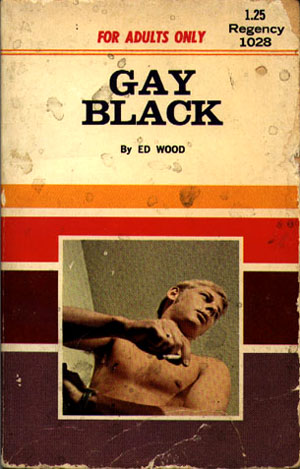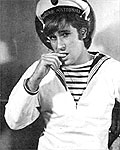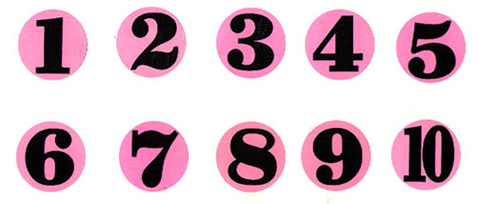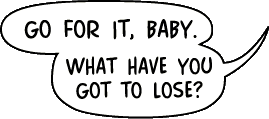One of my primary reasons for starting the print version of Rumpus
Room back in 1994 was that I had a burning, frustrated passion for graphic design.
I had gotten it stuck in my head at an early age that I wanted to be a “graphic artist” (I term I now use in reference to printmakers and draughtsmen) — at the time I suppose I thought of it as a more practical goal than my original desire to draw comic books for a living. As time went on, my interest in traditional forms of art never wavered, but I was thinking of graphic design as my vocation.
Working as the graphics editor for The Owl, the school paper at Regis, had whetted my appetite for working with type and illustration, and offered me some of the tools needed to produce Kumquat Popsicle, the one-shot zine that my friend Neil and I produced our senior year. I really loved the kind of visual assemblage that was required to put a zine together, and also got a real charge from having the final creative say in the end product. I bucked the running trend of my college-prep high school and headed off to art school at B.U. on a full scholarship, and put my design work on hold for the first two years while I studied painting, drawing, sculpture, and art history.
I really flowered, though, once I started the design program as a junior. I had already started hanging around the department the year before, since my enthusiasm was too big for me to keep in check, and was anxious to get started. Once I started dealing with honest-to-goodness graphic design issues, I realized that the “secondary” career choice of my youth was probably the best thing I ever pursued. To me, solving the problems and issues involved in graphic design seemed to be the perfect synthesis of my desire and aptitude for art, math, writing, and being anal-retentive. I came to realize that graphic design could be as much a vehicle for self-expression as any traditional forms of art, it just involved different processes and problems. And I could get paid to do it for a living, to boot.
I took it very seriously — I was a total nerd. By the time I graduated, I didn’t think that I had learned all I really felt I ought to, especially about typography, but I was happily free-lancing at a design studio in Chestnut Hill, and figured I would learn along the way. After that gig petered out, I snapped at a chance to take a job as a typesetter for the B.U. Office of Publications, thinking of it as an opportunity to do an apprenticeship of sorts and just focus on the minutiae of type for a while.
Well, that “while” turned into two-and-a-half years of the best education that I ever got in my life, but it was leaving me feeling pretty creatively stifled. All day long fine-tuned my typographic and technological skills, but was usually unable to exercise much creative judgement at all, expected to assist other designers in their work.
I made a brief attempt to take advantage of B.U.’s employee tuition remission program and I started the Graduate Graphic Design program. Big mistake. I was basically wasting time in a class of foreign students with little to no design background, and I spent the whole time repeating work I had done during my last two years as an undergrad. I lasted a semester-and-a-half. By the time I quit grad school, I was incredibly frustrated with my lack of outlets for real design work — especially work that would allow me some degree of expression — so I decided to pursue a self-education. I basically had a good idea of what I wanted to learn, and I would be better off seeking the answers myself. I figured grad school might be a good idea in the future if I felt like I’d hit a roadblock and need some external guidance, but I was to be my own “sensei” for a little while.
So on my return from a trip to visit my oldest pal Eddie in California, I decided to muster whatever motivation I could and turn my experiences from the trip into a zine. Finally, I had some material that I felt strongly about, a creative focus, a particular set of design problems I wanted to tackle, and the available cash to pull it off. It went well and was extremely satisfying, and the mood carried me through to a second issue, which also went well, and for which I set myself a different set of design problems to tackle.
I was sidetracked for a while after that by a few very long-overdue romantic involvements and various other occupations, and then the urge hit me again to take a big step forward with my creative self-improvement program. So I quit the job I then had as a typesetter/techie for Candlewick Press, a children’s book publisher in Cambridge, and free-lanced back at B.U. long enough to save up the money to move back to New York (money which I actually blew on a trip to China, but that’s another story altogether). The point of that was to team up with my other best pal Mark to devote ourselves to an ongoing lifestyle of constructive creative ambition. We’re doing okay with all the side projects, but I’m very happy to report that my career as a designer has finally blossomed now that I’m out of Boston. After a couple of lean weeks down here, I landed a free-lance gig at Thirteen/WNET, New York’s PBS television station, which which lasted for eight moths and still rears its ugly head now and then. I’m also staring down the mouth of a lucrative and intriguing position with the American Society of Mechanical Engineers, which holds some promise for interesting challenges and good perks. I’m finally able to channel all that creative energy into my professional life, which has helped me to become a MUCH better designer than I once was, and that has also given me a renewed vigor once it comes to my personal work.
So wish me luck on a continuing life as a stuck-up, pretentious, arty bastard who’s able to do for a living exactly what he would do for fun if he had to pay the rent by working as a short-order fry cook.














